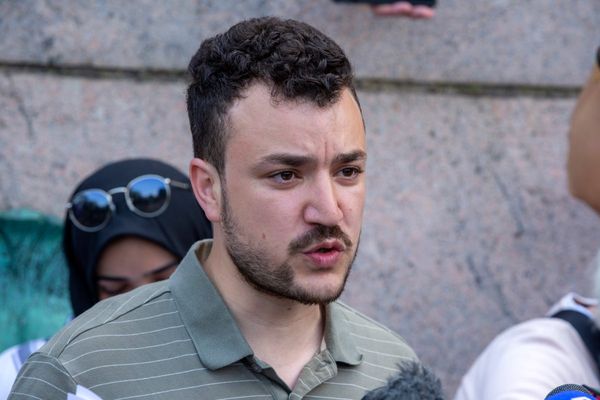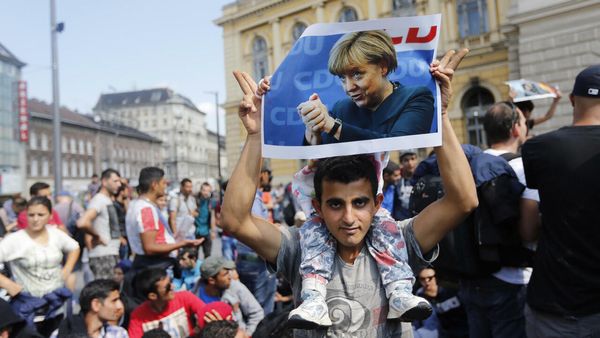Russia has officially become the most sanctioned country in the world, surpassing Iran, Syria and North Korea, as its invasion of Ukraine nears a third week.
The country has been subjected to over 5,000 crippling sanctions, according to data from Castellum.AI, 2,778 of which were introduced after February 22.
In comparison, it took 10 years for Western nations to impose the same type of sanctions on Iran.
Russia is now subject to more targeted sanctions than Iran, Venezuela, Myanmar and Cuba combined, according to the data.
The next most sanctioned country is Iran with 3,616 targeted sanctions, followed by Syria with 2,608 sanctions and North Korea with 2,077.
Western countries have moved to target Russia's oligarchs, sovereign debt, President Vladimir Putin himself and cut off most of Russia's banks from the SWIFT financial system, in retaliation for its invasion of Ukraine on February 24.
Australia, the EU, Switzerland and Canada have implemented more expansive sanctions which have targeted members of the Russian Duma, oligarchs, banks and companies, according to Castellum.AI.
The US, however, has so far avoided targeting members of Russia's parliament and has rather focused its sanctions on banks, their affiliates and oligarchs and their families.
Sanctions announced on February 26, which cut off Russia's government from foreign reserves held overseas and restricted access to SWIFT, caused the government to lose about half of its foreign reserves.
The data shows 90 per cent of sanctions have to date been aimed at politicians, top government officials and rich influential Russians — a strategy the West hopes would place financial pressure on those closest to Mr Putin.
US bans Russian oil imports
The US took a step further on Tuesday and imposed an immediate ban on Russian oil imports, sparking a further increase in the oil price.
"We will not be part of subsidising Putin's war," President Joe Biden said, calling the new action a "powerful blow" against Russia's ability to fund the ongoing offensive.
Russia warned the West on Wednesday that it was working on a broad response to sanctions that would be swift and felt in the West's most sensitive areas.
"Russia's reaction will be swift, thoughtful and sensitive for those it addresses," Dmitry Birichevsky, the director of the Foreign Ministry's department for economic cooperation, was quoted as saying by the RIA news agency.
Dr Wolodymyr Motyka, a retired commerce academic from the University of Newcastle, told the ABC the crippling effects of Western sanctions, while slow at first, are beginning to hit the Russian economy hard.
Credit rating agency Moody's cut Russia's credit rating to Ca on Sunday, the second-lowest rung of its ratings ladder.
Moody's said its decision to cut Russia's rating was "driven by severe concerns around Russia's willingness and ability to pay its debt obligations".
Dr Motyka said Russia could go into default in a couple of weeks, if its credit rating declines further.
"A sovereign state that goes into default means that international finance that's got money to invest … that finance dries up because it means in simple terms you don't want to invest in a country where it is highly unlikely that you'll even get your capital back," Dr Motyka said.
"When a country reaches default status, you can basically say it [the economy] is been knocked to the ground … problems just keep compounding."
Companies suspend Russian operations
Many corporations have announced they will be suspending their operations in Russia.
A list compiled by Yale University's School of Management shows about 300 companies have withdrawn from the country.
They include airlines, luxury brands, popular car manufacturers, technology giants and Mastercard and Visa.
On Tuesday, McDonald's, Starbucks, Coca-Cola, PepsiCo and General Electric all announced they were temporarily suspending their business in Russia in response to the country's invasion of Ukraine.
"Our values mean we cannot ignore the needless human suffering unfolding in Ukraine," McDonald's President and CEO Chris Kempczinski said in an open letter to employees.
The burger giant said it would temporarily close 850 stores but continue paying its 62,000 employees in Russia "who have poured their heart and soul into our McDonald's brand".
However, some companies and major hotel brands still remain in the country, according to the Yale University list.







